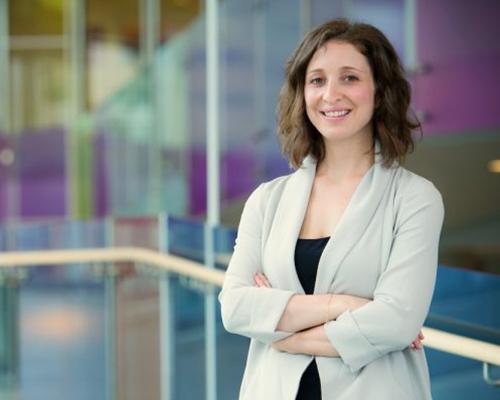Dr. Jacquelyn Cragg, a postdoctoral fellow with the International Collaboration on Repair Discoveries (ICORD) at UBC, has been awarded the L’Oréal-UNESCO For Women In Science International Young Rising Talent Prize for North America.

Dr. Jacquelyn Cragg, a postdoctoral fellow with the International Collaboration on Repair Discoveries (ICORD) at UBC (Photo: Martin Dee)
Cragg, a neuro-epidemiologist, is only the third Canadian to ever win this prestigious award, now in its 21st year. She is one of 15 promising young women scientists chosen from an international group of almost 280 national and regional fellowship winners for 2019.
“It’s very exciting because for this fellowship I will travel to Paris and spend a full week participating in events related to women in science,” Cragg says.
She is pursuing postdoctoral studies in the laboratories of Drs. Wolfram Tetzlaff and John Kramer. In her research, Cragg uses statistical algorithms to study factors that influence the progression of spinal cord injury, amyotrophic lateral sclerosis (ALS) and Parkinson’s disease.
“I really enjoy the analytical side of my work but I also like that my research will ideally make an impact in the health arena as well,” she says.
She leverages clinical and population “big data” sources and machine-based learning to identify novel, reliable predictors of disease progression, and understand how diverse factors interact to predict long-term outcomes. She aims to be a world leader in neuro-analytics, helping to uncover innovative treatment strategies and therapies for people suffering with neurological diseases.
“Overcoming gender stereotypes and encouraging girls to grow their interest in science should start from an early age.”
Dr. Jacquelyn Cragg
Cragg received a regional L’Oréal-UNESCO 2018 Excellence in Research Fellowship in Ottawa where she met The Honourable Kirsty Duncan, Minister of Science and Sport.
“Minister Duncan is incredibly supportive of women in science,” Cragg said. “She was very passionate when she spoke with us, especially since she was a scientist herself.”
The L’Oréal-UNESCO awards were created with the intention of improving women’s representation in science. Currently 29 per cent of scientific researchers are women, 11 per cent of senior academic roles are held by women, and three per cent of Nobel Prizes for science have been awarded to women.
As a young child, Dr. Cragg said she benefitted from the guidance of supportive teachers who encouraged her interest in science and provided her with extra school materials.
“Growing up, I had great teachers whose dedication and willingness to answer my questions allowed me to pursue my passion for mathematics and biology,” she says.
Encouraged by teachers to enter mathematics competitions, explore lateral thinking at “Challenge Camps” and attend science fairs, Cragg developed a strong knowledge of math, statistics and science, creating a robust foundation for her future career.
Despite the evidence that men and women have the same inherent scientific ability, she believes there are clear differences in the way that raw ability is nurtured over time, with distinct gender biases creeping in.
“Overcoming gender stereotypes and encouraging girls to grow their interest in science should start from an early age,” she says. “Girls and boys must know that everyone can do the same things.”
Cragg has completed studies at Harvard University and Balgrist University Hospital in Zurich and says her experience at UBC stands out.
“At UBC there are so many amazing experts in different areas. If you send a quick email you can have instant collaboration,” she says. “I find it’s a great working environment. I’ve worked all over the world now and I think UBC is top-notch.”
Cragg’s research is supported by the Branco Weiss Fellowship – Society in Science, the Michael Smith Foundation for Health Research, the Michael J. Fox Foundation, and the Canadian Institutes of Health Research.
She will receive her award on March 14 at UNESCO’s Paris headquarters.